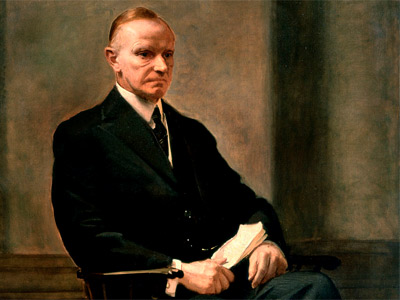Reassessing the Coolidge Legacy
Mini Teaser: Despite poor reviews from most historians, Silent Cal presided over a robust economy, surpluses, serious reductions in the national debt and generally very good times.
Shlaes adds, “Roosevelt attacked the rich, but his attack seemed odd, coming as it did from a wealthy man. More loyal than he felt, Coolidge defended Hoover, noting it was important to remember that Hoover came from a common background: ‘He was not born to the enjoyment of generations of inherited wealth.’”
After Roosevelt won, writes Shlaes, Coolidge told a friend, “I feel that I no longer fit in with these times.” The country was turning, and New England and all that it symbolized were passé or worse. “Even Robert Frost, who had felt himself unassailable, now sensed that he was wrong for what he called ‘these times.’” It was the dawning of the age of the ideologue. Shlaes quotes Isidor Schneider, writing in the left-wing Nation, as accusing Frost of replying to contemporary ideas “with know-nothing arrogance.”
Shlaes recounts that on January 5, 1933:
The newspapers greeted Americans with stories of the incoming administration. . . . Now it seemed that Roosevelt would take greater license than other Presidents. ‘Plan Free Hand for Roosevelt,’ read the headline on page one of The Wall Street Journal. Coolidge went to the office but did not feel well; around ten his secretary, Harry Ross, drove him home.
When, around lunchtime, Grace went upstairs and called to him, he did not respond. She found him dead in his dressing room. Writes Shlaes, “He had been shaving, just as he had been the first time she saw him that day through the window on Round Hill.” But this time, there was no laughter.
The funeral was “astonishingly simple for a former president.” There were few guests—among them Al Smith, Bernard Baruch, Eleanor Roosevelt, the Hoovers and old friends. “There was no eulogy, no address, just two hymns. . . . Even in the duration of the event, Coolidge made himself present: the service lasted only twenty-two minutes.”
Al Smith observed that Coolidge’s greatest accomplishment was “to restore the dignity and prestige of the presidency when it had reached ‘the lowest ebb in our history.’” He added that Coolidge was “in the class of presidents who were distinguished for character more than for heroic achievements.”
“But everyone knew,” writes Shlaes, “even on that Northampton day in January 1933, that sometimes character mattered more than achievements; or that the achievements of character might not always be evident at first.”
In his life and service to his country, Calvin Coolidge championed many of our once-basic national ideals, among them “civility to one’s opponents, silence, smaller government, trust, certainty, restraint, respect for faith, federalism, economy, and thrift,” all concepts not always reflected today in our politics, our economic thought or our dealings with one another.
Amity Shlaes, in this splendid and highly readable study, makes a powerful case for a reevaluation of our nearly forgotten president and the old American verities and virtues he personified.
John R. Coyne Jr. is a former White House speechwriter and the coauthor of Strictly Right: William F. Buckley and the American Conservative Movement.
Pullquote: In 1923, when President Harding died, the national debt stood at more than $22 billion. When President Coolidge left office six years later, the debt had been reduced to less than $17 billion.Image: Essay Types: Book Review
Essay Types: Book Review 